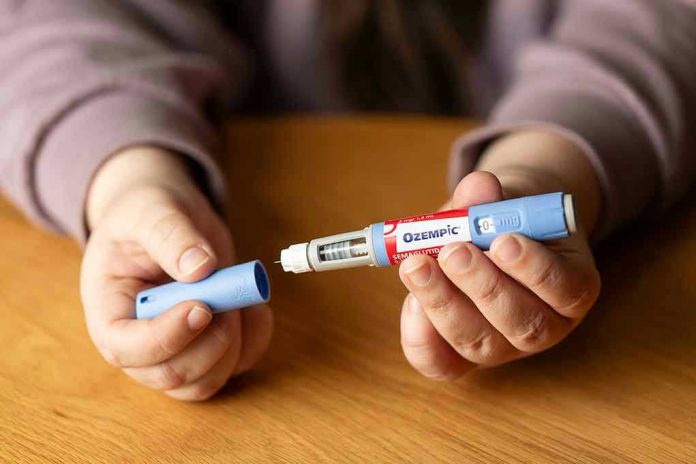
America faces a new health threat as unregulated peptide drugs flood the market, putting families and constitutional values at risk while lawsuits mount over life-altering side effects.
Story Snapshot
- The “peptide gold rush” follows Ozempic’s rise, driving demand for risky weight loss drugs and fueling rampant off-label use.
- Thousands of lawsuits allege severe injuries, including gastroparesis, vision loss, and kidney damage linked to GLP-1 drugs.
- FDA warnings highlight a surge in counterfeit and unapproved peptide products, exposing Americans to unregulated health risks.
- Regulatory gaps and aggressive pharmaceutical marketing undermine patient safety, eroding public trust and conservative safeguards.
Peptide Craze Expands Beyond Ozempic, Raising National Concerns
Since Ozempic’s mainstream adoption for rapid weight loss, the American pharmaceutical market has shifted toward a broader “peptide gold rush.” Drugs originally designed for diabetes, such as semaglutide in Ozempic and Wegovy, now see widespread off-label use among consumers eager for fast results.
This demand, amplified by celebrity endorsements and social media, has outpaced regulatory oversight, resulting in shortages and a proliferation of unapproved or counterfeit products. The trend poses a serious threat to conservative values of personal responsibility and limited government, as families encounter new dangers in pursuit of weight loss—often without informed consent.
As the market expands, legal and medical scrutiny intensifies. From 2023 to late 2025, over 2,900 lawsuits have been consolidated in multidistrict litigation against manufacturers like Novo Nordisk and Eli Lilly. Plaintiffs allege failure to warn about severe side effects, including gastroparesis—a debilitating stomach paralysis—vision loss, and kidney injury.
Expert testimony and recent peer-reviewed studies, such as those published in JAMA Ophthalmology, have linked semaglutide to rare but serious complications. Medical professionals, including endocrinologists and ophthalmologists, now call for stronger FDA warnings and black box alerts to protect patient safety. The scale rivals past pharmaceutical mass torts, with legal experts predicting billions in settlements and lasting consequences for the drug industry.
Regulatory Failures Enable Counterfeit and Unapproved Peptide Products
Regulatory agencies like the FDA face mounting challenges. The rapid embrace of GLP-1 drugs for weight loss has exposed cracks in oversight, especially regarding compounding pharmacies and online sales. As demand outstripped supply, compounding pharmacies began filling prescriptions with custom, sometimes unapproved peptide formulations, opening the door to counterfeit and unsafe products.
The FDA has responded with public warnings, but the complexity of monitoring compounded and black-market drugs leaves patients vulnerable. These regulatory gaps undermine the constitutional principle of limited, effective government and threaten to erode public trust in medical authorities.
Aggressive pharmaceutical marketing and limited transparency further exacerbate the crisis. Companies defend the safety of their blockbuster drugs in court, challenging evidence of causation for reported injuries. Meanwhile, plaintiffs’ attorneys and advocacy groups push for broader consumer warnings and compensation.
The legal landscape remains unsettled, with bellwether trials and expert testimony scheduled into 2026. Despite the FDA’s removal of Ozempic from the drug shortage list in February 2025, litigation and safety concerns persist, illustrating the ongoing need for vigilant regulatory action and informed public debate.
Impact on Families, Values, and Conservative Priorities
The peptide gold rush’s consequences reach far beyond individual patients. Families face uncertainty as severe side effects disrupt lives, strain healthcare systems, and impose economic burdens. Conservative priorities—family values, individual liberty, and constitutional protections—are jeopardized when unregulated drug markets and government inaction expose Americans to preventable harm.
The erosion of public trust in pharmaceutical companies and regulatory agencies demands renewed vigilance and accountability. As lawsuits climb and new risks emerge, the case for stricter oversight, transparent warnings, and protection of conservative values grows stronger. Americans must stay informed and demand that government and industry respect both their health and their freedoms.
In the long term, the fallout from this crisis may reshape drug approval policies, compounding pharmacy regulation, and pharmaceutical marketing. Patients and families deserve clear information, safe products, and a regulatory system that upholds constitutional principles and conservative safeguards.
As the peptide gold rush continues, the battle for accountability and transparency remains a defining issue for the health and security of America’s future.
Sources:
King Law (Ozempic Lawsuit, Nov 2025 Update)
Darrow AI (Ozempic MDL: Background, Timeline, & 2025 Updates)
Lawsuit Legal News (Ozempic Lawsuit: Lawsuits Filed Against Ozempic, Nov 2025)
Motley Rice (Ozempic® Lawsuit | November 2025 Legal Updates)
Lawsuit Tracker (Ozempic Lawsuit – August 2025 Update)
FDA (Concerns with Unapproved GLP-1 Drugs Used for Weight Loss)
Slepkow Law (Ozempic Lawsuit 2025, November 11th)




